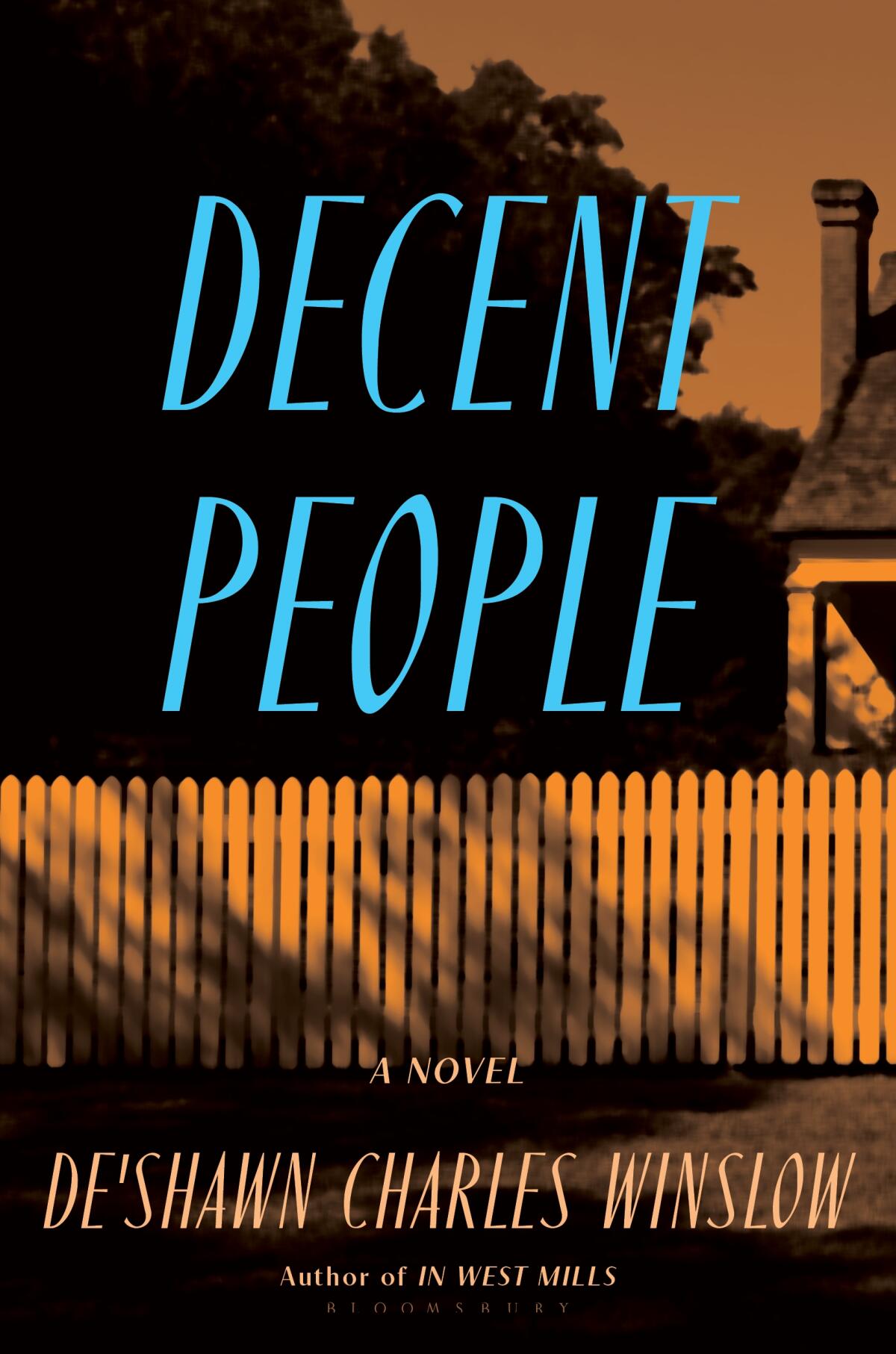How a gossipy, not-so-cozy mystery nails the segregated South of the ’70s

- Share via
Review
'Decent People'
By De’Shawn Charles Winslow
Bloomsbury: 272 pages, $28
If you buy books linked on our site, The Times may earn a commission from Bookshop.org, whose fees support independent bookstores.
West Mills, the small, segregated North Carolina town where “Decent People” unfolds, is a hotbed of gossip and long-simmering recrimination. The residents have plenty to talk about as the novel opens: The Harmon siblings — Marian, a prosperous doctor; Marva, who works as Marian’s nurse; and Lazarus, her driver — have been found murdered in their luxurious home. Nobody liked Dr. Harmon much; she was the kind of stuck-up professional who looked down her nose at everyone. But this is a little community, and murder is a big-city problem. Who would do such a thing?
As it turns out, the line forms to the left in De’Shawn Charles Winslow’s propulsive second novel, a murder mystery that doubles as a savvy examination of race and class. West Mills is one of those places where neighbors bite their lips in public before backbiting behind closed doors — until, that is, an unfortunate event, an unthinkable crime and a tenacious interrogator bring it all out into the open, leaving the dirty laundry fluttering in the wind. Winslow, revisiting the fictional setting (and some of the characters) of his first novel, “In West Mills,” has crafted a nonstop narrative that picks at the scabs barely concealing the wounds of American race relations.
The year is 1976, but no one here is in the mood for a bicentennial celebration. Josephine “Jo” Wright has just moved back to her hometown after several years in New York. In her late 50s, Jo is looking forward to some slow and friendly Southern living. She’s ready to settle down with Lymp, a longtime acquaintance and recent romantic interest. He’s a kind man and a safe bet. Then his three half-siblings are found shot to death in their own home.
Lymp, recently heard cursing the trio in public, is a suspect, though the sheriff doesn’t seem too interested in solving a crime that involves only Black people. That leaves Jo to conduct her own investigation and clear her fiancé’s good name — or perhaps discover his guilt.
Either way, she has no qualms about kicking the hornet’s nest. West Mills is a town teeming with carefully kept secrets, most of them connected to societal neuroses. Eunice Loving, who owns the local grocery store, lives in shame of her gay adolescent son, La’Roy, and she apparently asked Dr. Harmon to help “cure” him. It didn’t go well.

Marva’s best friend, a young, widowed white woman named Savannah, is pulled into the drama through her two sons. Savannah’s father, Ted, is a staunch segregationist who never forgave his daughter for marrying a Black man. The old man also owns the shopping center where Dr. Harmon ran her practice, and he has plenty of skeletons in his own closet. So does Lymp, as it turns out. Jo figures out early that she may not like everything she learns.
Almost nobody here is innocent, which is largely the point. Racism and segregation, still thriving in the ’70s South, corrode everything and everybody they touch in one way or another. “Decent People” adds homophobia to the mix, which scarcely needs more toxicity. Winslow has written not just an investigation of a crime, but also a diagnosis of a nation’s ills. Jo’s investigation needles nerves already worn thin — class resentments, racial distrust and transgressions swept under the rug. As Winslow writes, “Nothing stays secret for long in West Mills.”
S.A. Cosby’s “Blacktop Wasteland” stakes out territory in undersung places — and sings too of the complex lives of Black men.
In case that sounds ponderous, it bears emphasizing that “Decent People” also provides a great deal of pleasure. Gossip usually does, after all. “You think you on McMillan & Wife or something?” Lymp asks his inquisitive fiancée, tossing out a choice pop culture period detail. “These lawmen ’round here ain’t gon’ play with you.” Eunice, who sings in the choir, gives the reader her sensory experience of the church: “The scents of at least twenty different perfumes and colognes mixed with the odor from the cigars three of the deacons had puffed on before entering the church.” Winslow plays with narrative voice, alternating between different points of view, simulating the process by which information and disinformation are disseminated.
“Decent People” practically turns its own pages, creating in the reader an insatiable curiosity that matches Jo’s own. Winslow proves able to simultaneously drill down and step back, letting the details add up and weaving the grievances of one character into the next until you don’t know whom to trust. They’re all caught in the same web, and try as they might, they can’t talk their way out of it. But it sure is fun to watch them try.
Vognar is a freelance writer based in Houston.
Sign up for our Book Club newsletter
Get the latest news, events and more from the Los Angeles Times Book Club, and help us get L.A. reading and talking.
You may occasionally receive promotional content from the Los Angeles Times.




